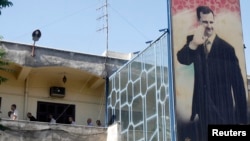Thousands of Syrians are disappearing and dying in government detention centers on a scale that amounts to state-sponsored "extermination," a U.N.-backed commission of inquiry reported Monday.
In compiling its findings, Out of Sight, Out of Mind: Deaths in Detention in the Syrian Arab Republic, the Independent International Commission of Inquiry on Syria interviewed more than 620 former detainees and witnesses.
The report gives harrowing accounts of detainees — men, women, children and the elderly — who have died as a result of torture or inhumane treatment in detention centers run by the government.
Tens of thousands more have simply disappeared without a trace, it says, part of a widespread and systematic campaign by government forces against Syrian civilians.
The report also details "inhumane and degrading" prison conditions — overcrowded cells, inadequate food and sanitation, and a lack of access to medical care — which have led to large numbers of deaths from infection and other untreated medical conditions.
Many detainees have been victims of sexual violence, and many suffer from psychological disturbances resulting from poor treatment.
One man’s account
Nothing in the report would surprise Mohamed, 37, a former Syrian government worker from Aleppo who in 2013 was arrested and detained by Syrian military and air force intelligence for several weeks.
He described to VOA being blindfolded and beaten, then locked in a small cell that held several other prisoners.
"The cell was designed for one person. We couldn't all lie down at the same time, so we took it in turns to sleep," he said.
Prisoners might be beaten for talking too loudly or spending more than a minute or two in the toilet. Food was inadequate, sometimes just a handful of ground wheat.
"The men were so thin — most had diarrhea, and many men suffered malnutrition," Mohamed said. "Many died while I was held there. People would be carried out and we would never hear of them again."
During his interrogation, guards beat the soles of Mohamed's feet. But he said he was lucky. Other detainees received far worse beatings — on their faces and all over their bodies.
Some, he said, were strung up by their wrists and left to hang from the ceiling for hours at a time.
"The cell I was in — it was called Group Four — was adjacent to the interrogation rooms, and I could hear the screaming and the shouting and the sound of blows," he said.
Aid groups constrained
Humanitarian groups like the International Committee of the Red Cross do what they can for prisoners, said Rafiullah Qureshi, a spokesman with the ICRC office in Damascus. In 2015, his office was given access to nine places of detention under Syrian government control.
"These hold, collectively, about 15,000 people," he said. "However, the total number of people detained inside Syria, either by the government of Syria or the various armed opposition groups, is much higher."
The ICRC facilitates communication between prisoners and their families.
It also monitors treatment and conditions inside the prisons — although, as the U.N. report notes, detainees are frequently held in facilities other than state-run prisons, such as anonymous, makeshift detention centers or the basements of intelligence buildings.
"Whatever we find there, whatever we want to improve there, then those recommendations and findings are communicated in a confidential manner to the Syrian authorities," Qureshi said.
This winter, for example, his office worked to improve toilet facilities and provide prisoners with blankets, rugs and clothes to protect them from the cold.
"Of course, our recommendations have to be in line with the domestic law of the country," he added, "the idea being that we have a constructive dialogue with the detaining authorities with the ultimate aim that the living conditions — material, psychological and other well-being — are improved."
Qureshi said he "glanced" at the commission's report this week, but that the ICRC does not comment publicly "on the findings of other humanitarian groups, as well as political activists."
Regime not sole abuser
This week's report to the U.N. notes that Damascus is not the only party in Syria responsible for serious violations of detainee rights.
It notes that torture, sexual violence and extrajudicial killings also are taking place in detention facilities run by Islamic State, armed opposition groups and the terror group Jabhat Al-Nusra.
Among its many recommendations, the commission is calling on the Syrian government to cease detention practices that threaten the lives of detainees and to provide rights groups like the ICRC and the commission itself immediate and unrestricted access to detention facilities.
The commission also is calling on the U.N. Security Council to sanction individuals and groups responsible for disappearances, torture and killings, and refer the situation to the International Criminal Court or similar judicial authorities, insisting that accountability for these and other crimes must be part of any political solution.












